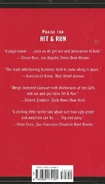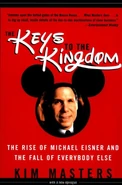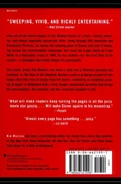The Keys to the Kingdom, subtitled How Michael Eisner Lost His Grip for the first edition and The Rise of Michael Eisner and the Fall of Everybody Else for the subsequent editions, is the biography written by Kim Masters on the life and career of Hollywood executive Michael Eisner, from birth, through meteoric rise to becoming one of the most powerful "Hollywood Moguls" in the 1980s at The Walt Disney Company, and beyond.
From 1976 through 1984 Eisner was a CEO at Paramount Pictures, and as President of Production in Features it was under his auspices that the Star Trek films franchise was initiated and propagated. During this period, he was appointed by his direct superior, Paramount President Barry Diller, to serve as the primary studio overseer of both the prior live-action franchise revitalization attempts (most notably Star Trek: Phase II), as well as the first three outings in the Star Trek movie line, Star Trek: The Motion Picture, Star Trek II: The Wrath of Khan and Star Trek III: The Search for Spock. His involvement with the Star Trek franchise are dealt with in detail in chapters 6 and 7 of the book, whereas chapters 2 and 5 mention in passing the brushes his superior Diller had with Star Trek prior to Eisner's appointment.
Summary[]
- From the interior dustjacket of the hardcover edition
- Michael Eisner has enjoyed one of the most brilliant careers in Hollywood history. From his early days at ABC Television with such hits as Happy Days and Laverne & Shirly through his years at Paramount with Raiders of the Lost Ark and Terms of Endearment, and culminating with his engineering of Disney's breathtaking rise from sleeping giant to entertainment juggernaut, Eisner always had the magic touch. But throughout his career, Eisner had always been linked to other powerful men – Barry Diller at ABC and Paramount and Frank Wells at Disney – who were able to temper his impulsive and sometimes deceptive personality.
- Ever since Frank Well's tragic death in a helicopter crash in 1994, Eisner has run Disney on his own, becoming increasingly Nixonian in his paranoia and isolation. As legions of top-level talent left Disney, he hired über agent Michael Ovitz from Creative Artists Agency to serve as his second-in-command – and ultimately firing him, infuriating many shareholders by offering him a multi-million severance package. Far more costly in every sense of the word was the bitter court battle he waged with his longtime lieutenant, Jeffrey Katzenberg. That litigation, in which it famously emerged that he once said of Katzenberg, "I hate the little midget," raised questions about Eisner's judgment and ability to lead Disney into the twenty-first century.
- Now, in Keys to the Kingdom, Kim Masters, coauthor of the New York Times bestseller Hit & Run, has crafted a gripping examination of how power is acquired in Hollywood – and how that power can become self-destructive. She takes us inside the executive suites and onto the studio sets, giving us a brilliantly detailed look at how decisions are made about what appears on movie and television screens.
- Based on hundreds of interviews with Hollywood's major players, Masters weaves Eisner's story together with those who have crossed his path; Barry Diller, the intimidating mogul who gave Eisner the opportunity to run Paramount Pictures; Jeffrey Katzenberg, the diminutive errand boy for New York mayor John Lindsay who became a "golden retriever" for Eisner and a key player in bringing animated hits like Lion King to the screen; Frank Wells, a Rhodes scholar who tried – almost successfully – to become the first man to climb the highest mountain on each continent and who had the wisdom to give Eisner the spotlight at Disney; and Michael Ovitz, the superagent, whose fall from Disney was one of the industry's most spectacular failures.
- Finally, Keys to the Kingdom is a captivating account of how Eisner's hubris led him to jeopardize his position at one of the world's most famous corporations. In the process, the face of Hollywood's power structure was transformed, careers were broken, and longtime personal relationships were shattered.
- From the back cover of the paperback edition
- Like one of the movie moguls of old, Michael Eisner is a titan – feared, powerful, and almost magically successful. After rising through ABC television and Paramount Pictures, he awoke the sleeping giant of Disney and sent it stomping across the entertainment landscape. But since the tragic death of Frank Wells in a helicopter crash in 1994, he has lacked – for the first time in his career -- a colleague who could temper his personality.
- The result, writes Kim Masters, has been a slide into a Nixonian paranoia and isolation. In The Keys to the Kingdom, Masters crafts a gripping account of this larger-than-life story of larger-than-life hubris, combining an insightful analysis of power in Hollywood with a vivid, deeply researched narrative that brings the personalities, the enmities, and the corporate mayhem to life.
- Excerpts of copyrighted sources are included for review purposes only, without any intention of infringement.
Contents[]
- Prologue
- Chapter 1: Poor Little Rich Boy
- Chapter 2: Enter the Dragon
- Chapter 3: Happy Days
- Chapter 4: Reversal of Fortune
- Chapter 5: Squirt
- Chapter 6: The Golden Retriever
- Chapter 7: The Killer Dillers
- Chapter 8: High Concept
- Chapter 9: Death of a Mogul
- Chapter 10: Risky Business
- Chapter 11: The Eighth Summit
- Chapter 12: A Ravenous Rat?
- Chapter 13: Hits and Misses
- Chapter 14: "A Whiff of the Mouse"
- Chapter 15: Winning Ugly
- Chapter 16: Toontown
- Chapter 17: Star Wars
- Chapter 18: One False Move
- Chapter 19: Mouschwitz
- Chapter 20: Beauty and the Debacle
- Chapter 21: The Crash
- Chapter 22: Chest Pains
- Chapter 23: A Bitter Divorce
- Chapter 24: Big Dreams
- Chapter 25: The Dominoes Fall
- Chapter 26: Superman Stumbles
- Chapter 27: A Platinum Parachute
- Chapter 28: Squaring off
- Chapter 29: Katz v. Mouse
- Chapter 30: "That Dark Person."
- Epilogue to the Paperback Edition (not in the hardcover edition)
- Source Notes
- Acknowledgements
- Index
Background information[]
- The hardcover edition came in a dust jacket, but the publisher had chosen to have another book reviewed on the backcover of the jacket.
- The book featured an unumbered twelve page black and white photo inset.
- Michael Eisner declined to be interviewed by Masters for this book. However, she had conducted several interviews with him prior to her book project and could draw from these for her book. Former co-workers Barry Diller and Jeffrey Katzenberger, with whom Eisner formed a close working triumvirate, nicknamed "The Killer Dillers" (hence the title of chapter 7), during his Paramount days and who were likewise closely involved with the Star Trek movies, did agree to be interviewed by Masters.
- Aside from her own conducted interviews, Masters made use of secondary publications sources, the most notable one as far as Star Trek was concerned, William Shatner's memoir Star Trek Movie Memories.



